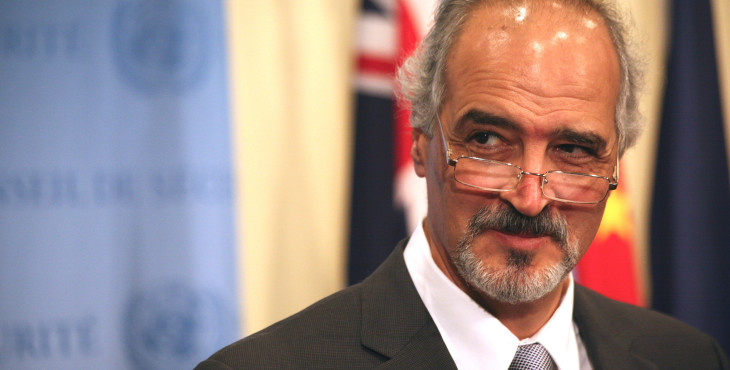U.N. elects Syria to top post fighting “subjugation of peoples”

Syrian ambassador Bashar Ja’afari (photo above) was re-elected as Rapporteur, February 22, 2018.
A UN watchdog group is criticizing UN chief Antonio Guterres for his blessings delivered Thursday before an anachronistic UN committee charged with “decolonizing” the Falkland Islands and Gibraltar — at the same time as the 24-nation entity elected by acclamation the genocidal Syrian regime’s representative to a leadership post. “I commend this body’s contribution,” said Mr. Guterres.
UN Watch instead is calling on Mr. Guterres, U.S. Ambassador Nikki Haley, and the EU’s UN ambassadors to condemn the world body’s “absurd and morally obscene” election of Syria to a senior post on a decolonization committee that is charged with upholding fundamental human rights in opposing the “subjugation, domination and exploitation” of peoples — a propaganda victory that—like before—will be trumpeted by the Assad regime.
The election of Syrian ambassador Bashar Ja’afari took place this afternoon in the 2018 opening session of the UN’s Special Committee on Decolonization.
Chile and India Failed to Vote Like Democracies
Hillel Neuer, executive director of the Geneva-based human rights group UN Watch, said that outgoing President Michele Bachelet of Chile should be “ashamed” that her country joined the consensus vote, as should India. Both democracies sit on the 24-nation committee that elected the Assad regime’s candidate by acclamation.
“It is incomprehensible for the UN on one day to lament the Syrian regime’s killing and wounding of hundreds of thousands of Syrians—to declare the regime guilty of a “monstrous campaign of annihilation” of its own people—and to then hand this gift of false legitimacy to the mass murderer Bashar al-Assad,” said Neuer.
“Today’s UN vote only helps the Assad regime portray itself a UN human rights arbiter. That’s an insult to Syria’s victims,” said Neuer. “Morally, Mr. Guterres should do the right thing and at the very least condemn the decision.”
Precedent: UNESCO Chief Criticized Syria’s Election in 2013
Although UN secretary-generals often insist that they cannot speak on elections conducted by member states, actions taken by other high UN officials prove otherwise.
For example, when Syria was elected to a UNESCO human rights committee in 2013, Irina Bokova, the head of UNESCO, went on record to say that the election was wrong.
Her spokesperson said: “Given the developments in Syria, the director-general does not see how this country can contribute to the work of the committees.”
This and other rare but important statements demonstrate that UN officials can act as the world’s moral voice when a UN committee makes obscene decisions —electing a regime that commits mass murder—which only cast a shadow on the reputation of the UN as a whole.”
Syria trumpeted a propaganda victory when a similar miscarriage of justice occurred in 2013:
“The re-election of Dr. Al-Jafari, according to many analysts and observers, is yet another recognition by members of the Committee of the Syrian important and key role.”
Decolonization Committee
Committee sessions debate the future of places such as Gibraltar, the Falklands, Bermuda, French Polynesia and New Caledonia.
It is mandated to uphold fundamental human rights in opposing the “subjugation, domination and exploitation” of peoples.
There are 17 territories still before the anti-Western committee, and most do not want independence — which is only one of the reasons the committee, dominated by third-world nations, is often criticized as a costly irrelevance.
The 17 territories still listed as colonies by the committee are American Samoa, Anguilla, Bermuda, the British Virgin Islands, the Cayman Islands, the Falklands, French Polynesia, Gibraltar, Guam, Montserrat, New Caledonia, Pitcairn, Tokelau, Turks and Caicos, St. Helena, the U.S. Virgin Islands and Western Sahara.
Corruption & Exotic Travel
The committee, which on Thursday spoke of its 2018 “Pacific regional seminar,” is notorious for its habit of holding regional seminars in tropical islands—”alternately in the Caribbean and the Pacific”—at considerable expense. Madeleine K. Albright, as U.S. representative at the United Nations in the late 1990s, called these expenditures “frivolous and unneeded.”
At the time, activities of the committee were investigated by the United Nations inspector general, Karl T. Paschke, who concluded that money was being squandered.
UN Watch is urging current U.S. ambassador Nikki Haley to follow her predecessor and finally speak out against the travesties of justice worked by this anachronistic and corrupt committee.












